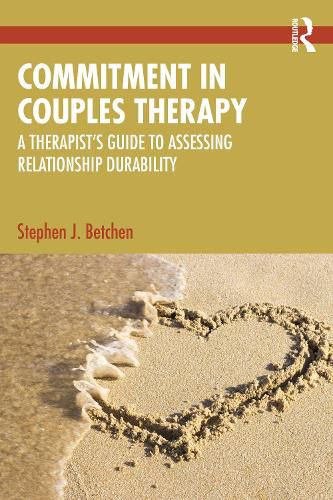Readings Newsletter
Become a Readings Member to make your shopping experience even easier.
Sign in or sign up for free!
You’re not far away from qualifying for FREE standard shipping within Australia
You’ve qualified for FREE standard shipping within Australia
The cart is loading…






Commitment in Couples Therapy offers a comprehensive clinical guide to help those who work with couples determine the authenticity of a couple's commitment, and to guide their decision on whether the relationship is worth salvaging.
The purpose of this book is to focus on those couples who have joined for reasons that pose a significant chance of relational failure. This specific dyad entails one seemingly "committed" partner and one apparently "less committed" partner, both of whom may be conscious or unconscious about their sabotaging behavior in the relationship. Betchen offers a clinical model to treat the commitment issue and help the couple's therapist skillfully uncover each partner's conflict with commitment, determine the couple's true relational status, and determine how to re-contract the relationship on more authentic grounds. Chapters provide coverage of the unconscious match process, the sociocultural, transactional, familial, and psychological factors behind commitment, and countertransference, with case studies throughout. Finally, this book offers critical assessment and treatment strategies for therapists to implement in their practice.
This book is an essential read for mental health clinicians of all levels, and a valuable resource for graduate students in marriage and family therapy programs.
$9.00 standard shipping within Australia
FREE standard shipping within Australia for orders over $100.00
Express & International shipping calculated at checkout
Commitment in Couples Therapy offers a comprehensive clinical guide to help those who work with couples determine the authenticity of a couple's commitment, and to guide their decision on whether the relationship is worth salvaging.
The purpose of this book is to focus on those couples who have joined for reasons that pose a significant chance of relational failure. This specific dyad entails one seemingly "committed" partner and one apparently "less committed" partner, both of whom may be conscious or unconscious about their sabotaging behavior in the relationship. Betchen offers a clinical model to treat the commitment issue and help the couple's therapist skillfully uncover each partner's conflict with commitment, determine the couple's true relational status, and determine how to re-contract the relationship on more authentic grounds. Chapters provide coverage of the unconscious match process, the sociocultural, transactional, familial, and psychological factors behind commitment, and countertransference, with case studies throughout. Finally, this book offers critical assessment and treatment strategies for therapists to implement in their practice.
This book is an essential read for mental health clinicians of all levels, and a valuable resource for graduate students in marriage and family therapy programs.